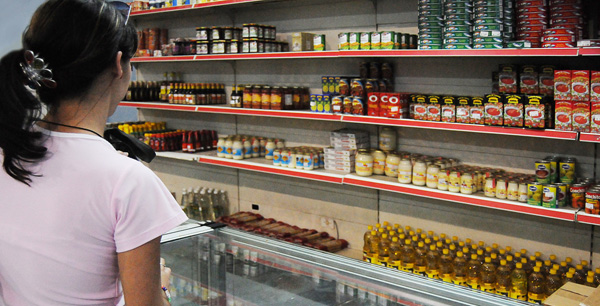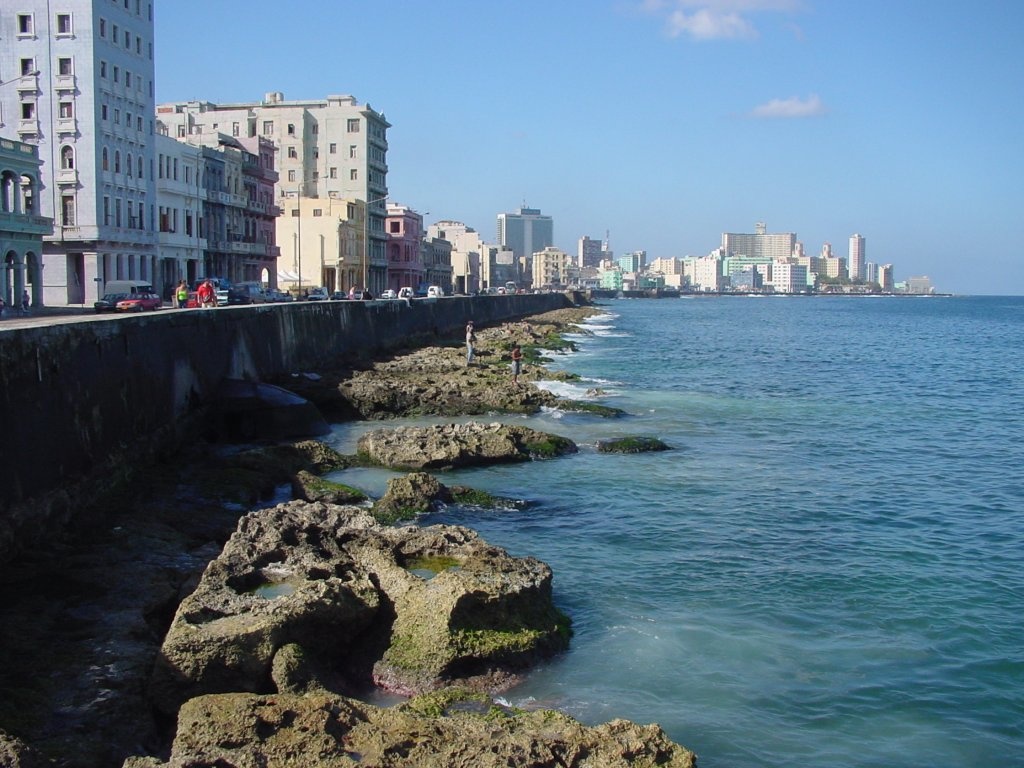The Ministry of Finance of Cuba has just given the best news of 2012, at least in regard to ordinary Cubans. It announced will unify the prices of 100 commodities, from soap to the chicken- in stores of currency (Divisas).
This measure increases the purchasing power of citizens, while attacking the inept and corrupt. Counterbalances some price increases, creating a tax system and the tightening of customs laws.
In Cuba all trade is in the hands of the state and monopolies, both private and public, generate economic inefficiencies.
One of their few advantages is that you can control prices, which until now was not done.
A shopkeeper will be more difficult to “fines”, the premium that apply to products for their own benefit. A very immoral corruption because it primarily affects the most humble, those who live on a salary in Cuban pesos.
Among the employees of the stores there are decent people but also the crime reaches such levels that protect managers denied access even to the TV official. I myself was victim of a beating from the guards at the Carlos III shopping center to keep me from shooting.
The penalty is not a new crime, almost a decade ago we published an article on BBC entitled “Cuba: Suffering to buy.” During our investigation we found a gas stove with a fine of $ 200 above the set price.
The same bike as a child was sold in stores with prices as varied as U.S. $ 34, $ 60, $ 80 and $ 120. While in Old Havana offered a $ 49 comforter at twice its price. A practice that 9 years later remains.
People jokingly said that the amount of gold chains you know how many years have you been working on a Cuban hard currency stores. Business is so good that some spend thousands of dollars to buy a job there.
A corrupt leaders are added inept, prices rise to compensate for its poor management, the products will spoil those who rob their own employees and the accumulation of unsold stocks by value.
Now, thanks to the Ministry of Finance, all of them will be forced to maintain the same prices. From this time the public will know that you are stealing $ 2 when they ask shopkeepers $ 6.5 for a kilo of chicken breast.
The newspaper Granma should get a special on better paper with the list of 100 products for every citizen to carry it in my pocket and would be very practical in stores mandatory public display to tie the hands of commercial crime.
Anyway they are creative, find other ways to gouge their countrymen. I wanted to sell a bag of washing powder with less weight and full of holes. They tried to convince me that the factory makes the holes for the product to “breathe”.
In few parts of the world are abused both customers and the worst is that they have been accustomed. The consumer accepts even be treated like a criminal, forbidding him to enter with checking your wallet and shopping bags to leave.
An old saying that the thief thinks that all are of the same condition, an idea that is perfectly suited to this story. It would be enough to enter the house to check some shopkeepers who live well above their salaries.
But neither is it now to launch a crusade against them because, as I once said Don Alejandro Robaina cigar, if a person agrees to work for such low wages is because from the beginning is thinking about how to steal.
However, nothing can justify dispossessing them money to Cuba’s most humble, so you have to put dikes to contain the excessive ambition of some. Even among the bandits must have some degree of honor or ethics.
Sources: Lettersfromcuba/FernandoRavsberg/BBC/UK/InternetPhoto/theCubanHistory.com
CartasDesdeCuba/The Cuban History/Arnoldo Varona, Editor
EL HONOR DE LOS BANDIDOS
El Ministerio de Finanzas de Cuba acaba de dar la mejor noticia del 2012, por lo menos en lo que concierne al cubano de a pie. Anunció que unificará los precios de 100 productos básicos -desde el jabón hasta el pollo- en todas las tiendas de divisas.
Esta medida aumenta el poder adquisitivo de los ciudadanos, a la vez que ataca a los ineptos y corruptos. Contrapesa un poco las alzas de precios, la creación de un sistema impositivo y el endurecimiento de las leyes aduanales.
En Cuba todo el comercio está en manos del Estado y los monopolios, tanto los privados como los públicos, generan ineficiencias económicas.
Una de sus pocas ventajas es que permiten controlar los precios, algo que hasta ahora no se hacía.
A los tenderos les será más difícil poner “multas”, ese sobreprecio que aplican a los productos para su propio beneficio. Una forma muy inmoral de corrupción porque afecta fundamentalmente a los más humildes, a los que viven de un salario en pesos cubanos.
Entre los empleados de las tiendas hay gente decente también pero el delito llega a tales niveles que para protegerse los gerentes le niegan el acceso incluso a la TV oficial. Yo mismo fui víctima de una golpiza de los guardias del centro comercial de Carlos III para impedirme filmar.
La multa no es un delito nuevo, hace casi una década publicamos en BBC Mundo un artículo titulado “Cuba: sufrir para comprar”. Durante nuestra investigación encontramos una cocina de gas con una multa de US$200 por encima del precio establecido.
La misma bicicleta de niño era vendida en las tiendas con precios tan diferentes como US$34, US$60, US$80 y US$120. Mientras en La Habana Vieja nos ofrecieron un edredón de US$49 en el doble de su precio. Una práctica que 9 años después sigue vigente.
La gente en broma dice que por la cantidad de cadenas de oro puedes saber cuántos años lleva un cubano trabajando en las tiendas de divisas. Es tan buen negocio que algunos invierten miles de dólares para comprar un puesto de trabajo allí.
A los corruptos se le suman los dirigentes ineptos, que suben los precios para compensar su mala gestión, los productos que se le echan a perder, los que le roban sus mismos empleados y la acumulación de existencias invendibles por la relación calidad-precio.
Ahora, gracias al Ministerio de Finanzas, todos ellos se verán obligados a mantener los mismos precios. A partir de este momento los ciudadanos sabrán que le están robando 2 dólares cuando los tenderos les piden US$6,5 por un kilo de pechuga de pollo.
El periódico Granma debería sacar un especial en mejor papel con la lista de los 100 productos para que cada ciudadano la lleve en el bolsillo y sería muy práctico que en las tiendas sea obligatoria su exposición pública para atarle las manos a la delincuencia comercial.
De todas formas ellos son creativos, encontrarán otras vías para esquilmar a sus compatriotas. A mí me quisieron vender una bolsa de jabón en polvo con menos peso y llena de huecos. Trataron de convencerme de que la fábrica hace los agujeros para que el producto “respire”.
En pocas partes del mundo se maltrata tanto a los clientes y lo peor es que estos se han acostumbrado. El consumidor acepta incluso que lo traten como a un delincuente, prohibiéndole entrar con cartera y revisándole las bolsas de la compra al salir.
Dice un viejo refrán que el ladrón piensa que todos son de su misma condición, una idea que se adapta perfectamente a esta historia. Bastaría entrar a la casa de algunos tenderos para comprobar que viven muy por encima de sus salarios.
Pero tampoco se trata ahora de lanzar una cruzada contra ellos porque, como me dijo una vez el tabaquero Don Alejandro Robaina, si una persona acepta trabajar por tan bajo salario es porque desde el principio está pensando en cómo robarle.
Sin embargo, nada puede justificar que les arrebaten el dinero a los cubanos más humildes, por eso hay que poner diques para contener la desmedida ambición de algunos. Hasta entre los bandidos debe de haber algún grado de honor o de ética.
Sources: Lettersfromcuba/FernandoRavsberg/BBC/UK/InternetPhoto/theCubanHistory.com
CartasDesdeCuba/The Cuban History/Arnoldo Varona, Editor




